Jan Peter Balkenende facts for kids
Quick facts for kids
Jan Peter Balkenende
|
|
|---|---|
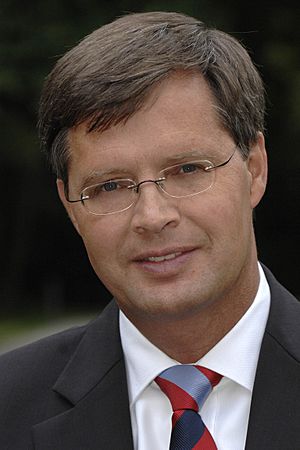
Oficial portrait, 2006
|
|
| Prime Minister of the Netherlands | |
| In office 22 July 2002 – 14 October 2010 |
|
| Monarch | Beatrix |
| Deputy |
See list
Eduard Bomhoff
(2002) Johan Remkes (2002–2003) Roelf de Boer (2002–2003) Gerrit Zalm (2003–2007) Thom de Graaf (2003–2005) Laurens Jan Brinkhorst (2005–2006) Wouter Bos (2007–2010) André Rouvoet (2007–2010) |
| Preceded by | Wim Kok |
| Succeeded by | Mark Rutte |
| Leader of the Christian Democratic Appeal | |
| In office 1 October 2001 – 9 June 2010 |
|
| Preceded by | Jaap de Hoop Scheffer |
| Succeeded by | Maxime Verhagen |
| Leader of the Christian Democratic Appeal in the House of Representatives | |
| In office 30 November 2006 – 9 February 2007 |
|
| Preceded by | Maxime Verhagen |
| Succeeded by | Maxime Verhagen |
| In office 30 January 2003 – 21 May 2003 |
|
| Preceded by | Maxime Verhagen |
| Succeeded by | Maxime Verhagen |
| In office 1 October 2001 – 11 July 2002 |
|
| Preceded by | Jaap de Hoop Scheffer |
| Succeeded by | Maxime Verhagen |
| Member of the House of Representatives | |
| In office 30 November 2006 – 22 February 2007 |
|
| In office 30 January 2003 – 27 May 2003 |
|
| In office 19 May 1998 – 22 July 2002 |
|
| Personal details | |
| Born |
Jan Pieter Balkenende Jr.
7 May 1956 Biezelinge, Netherlands |
| Political party | Christian Democratic Appeal (1980–present) |
| Spouse |
Bianca Hoogendijk
(m. 1996) |
| Children | 1 |
| Education | Free University Amsterdam (LLB, BA, LLM, MA, PhD) |
| Signature | |
Jan Peter Balkenende is a Dutch politician and lawyer. He served as the Prime Minister of the Netherlands from July 22, 2002, to October 14, 2010. He was a member of the Christian Democratic Appeal (CDA) party.
During his time as Prime Minister, his governments made important changes. These included reforms to the education system and immigration laws. His leadership helped the country recover after the 2008 financial crisis. He is one of the longest-serving Prime Ministers in the Netherlands since World War II.
After leaving politics, Balkenende became a professor. He also works as a director in the private sector. In 2022, he received the special title of Minister of State.
Contents
Early Life and Education
Jan Pieter Balkenende Jr. was born on May 7, 1956. He grew up in Biezelinge, a town in the Zeeland province of the Netherlands. His father was a grain merchant, and his mother was a teacher. His family belonged to the Reformed faith.
As a child, Balkenende loved football and supported the team PSV Eindhoven. He often went to matches with his father. He also enjoyed visiting the local music school and theatre. He attended a Reformed Protestant primary school and a Christian secondary school. He graduated from secondary school in 1974.
He went on to study at the Vrije Universiteit Amsterdam. There, he earned degrees in history and law. He also completed a PhD in law in 1992.
Today, Balkenende lives in Capelle aan den IJssel with his wife, Bianca Hoogendijk, and their daughter, Amelie. While he was Prime Minister, he did not live in the official residence.
Start of Political Career
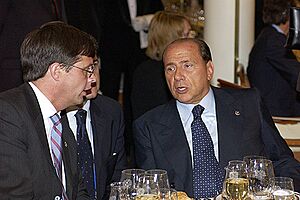


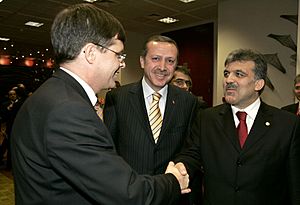
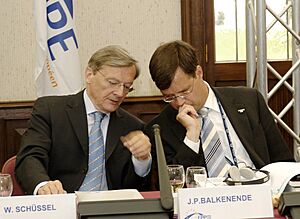
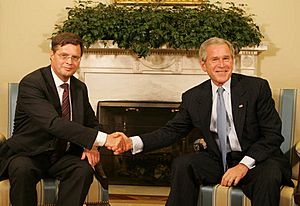
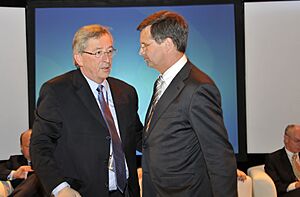
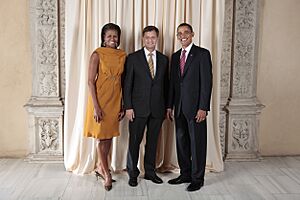
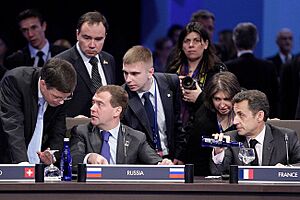
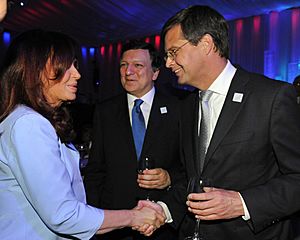
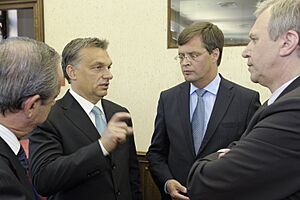
Balkenende started his political journey working for the CDA's research institute. He also served as a city councilman in Amstelveen. As a councilman, he once proposed a funny rule. It said that council members should get a croquette (a Dutch snack) if their meetings went past 11 PM. This rule was actually passed!
In 1993, he became a professor at the Free University of Amsterdam. He taught about Christian-Social ideas.
In 1998, Balkenende became a member of the House of Representatives of the Netherlands. This is like the main parliament in the Netherlands. He focused on financial matters for his party. In 2001, he became the leader of the CDA party. He then led the party into the 2002 elections.
Prime Minister of the Netherlands
Jan Peter Balkenende served as Prime Minister for four different governments. Each government was called a "cabinet."
First Cabinet
In July 2002, Queen Beatrix asked Balkenende to form a new government. This happened after the general elections. His first government, called the Cabinet Balkenende I, included the Pim Fortuyn List (LPF) party. However, this government lasted only 87 days. It ended because of disagreements within the LPF party.
Second Cabinet
After new elections in 2003, Balkenende formed his second government. This time, it included the CDA, the People's Party for Freedom and Democracy (VVD), and D66. This government focused on making big changes. They reformed public services, social security, and healthcare. They also worked to reduce crime and create stricter immigration rules.
These changes were sometimes unpopular with the public. However, Balkenende's position as party leader remained strong. His popularity improved as the Dutch economy began to recover. In July 2004, the Netherlands, with Balkenende as Prime Minister, took on the role of leading the European Union for a period.
Third Cabinet
On June 30, 2006, the D66 party left the government. This was due to a disagreement over how an immigration issue was handled. Balkenende resigned as Prime Minister for the second time. He then formed a temporary government, the Cabinet Balkenende III. This government, made up of CDA and VVD, stayed in power until new elections were held in November 2006.
Fourth Cabinet
In the 2006 elections, Balkenende's CDA party remained strong. He then formed his fourth government with the Labour Party (PvdA) and the Christian Union. This government started in February 2007 and was planned to last until 2011.
However, this fourth government also ended early. In February 2010, it fell apart because of disagreements. The main issue was whether to extend the Dutch military mission in Afghanistan. Balkenende's government continued as a caretaker government with limited powers.
2010 Election and Retirement
Balkenende led the CDA party into the 2010 general election. During his campaign, he made a comment that caused some discussion. He told a TV presenter, "You look so cute." This comment was seen as sexist by some people, and he later apologized for it.
The CDA party did not do well in the 2010 election. On June 9, 2010, Balkenende took responsibility for the poor results. He resigned as the leader of the CDA and also gave up his seat in parliament. He officially left office as Prime Minister on October 14, 2010.
Other Interesting Facts
In 2004, during his second term, Balkenende had a serious infection. He recovered fully after receiving treatment in the hospital.
In 2005, a Belgian minister compared Balkenende to "Harry Potter and a petty rigid bourgeois." This caused a small diplomatic issue, and the Belgian ambassador had to apologize. Balkenende was sometimes called "JP" or "Harry Potter" by others.
He had a good relationship with people from Suriname and the Netherlands Antilles. He often attended their cultural celebrations.
Balkenende was a member of the Reformed Churches in the Netherlands. Later, he became a member of the Protestant Church in the Netherlands.
Honours and Awards
Jan Peter Balkenende has received many honours and awards.
National Honours
- Knight Grand Cross of the Order of Orange-Nassau (2010)
Foreign Honours
 Belgium: Commander of the Order of Leopold
Belgium: Commander of the Order of Leopold Brazil: Grand Cross of the Order of the Southern Cross
Brazil: Grand Cross of the Order of the Southern Cross Chile: Grand Cross of the Order of Bernardo O'Higgins
Chile: Grand Cross of the Order of Bernardo O'Higgins Germany: Grand Cross of the Order of Merit of the Federal Republic of Germany
Germany: Grand Cross of the Order of Merit of the Federal Republic of Germany Ghana: Companion of the Order of the Star of Ghana
Ghana: Companion of the Order of the Star of Ghana House of Habsburg: Honorary Knight of the Order of St. George
House of Habsburg: Honorary Knight of the Order of St. George Jordan: Grand Cordon of the Order of Independence
Jordan: Grand Cordon of the Order of Independence Luxembourg: Grand Cross of the Order of Merit of the Grand Duchy of Luxembourg
Luxembourg: Grand Cross of the Order of Merit of the Grand Duchy of Luxembourg Poland: Grand Cross of the Order of Merit of the Republic of Poland
Poland: Grand Cross of the Order of Merit of the Republic of Poland Romania: Grand Cross of the Order of the Star of Romania
Romania: Grand Cross of the Order of the Star of Romania Sweden: Commander Grand Cross of the Order of the Polar Star
Sweden: Commander Grand Cross of the Order of the Polar Star
Awards
- Golden Honorary Medal, from the municipality Amstelveen (1998)
Honorary Degrees
- Honorary doctorate in laws, Hope College (United States, 2012)
- Honorary doctorate in human letters, Hofstra University (United States, 2011)
- Honorary doctorate in sociology, Yonsei University (South Korea, 2010)
- Honorary doctorate in systems, design and management, Keio University (Japan, 2009)
- Honorary doctorate in theology, Károli Gáspár University of the Hungarian Reformed Church (Hungary, 2005)
See also
 In Spanish: Jan Peter Balkenende para niños
In Spanish: Jan Peter Balkenende para niños
 | James Van Der Zee |
 | Alma Thomas |
 | Ellis Wilson |
 | Margaret Taylor-Burroughs |

